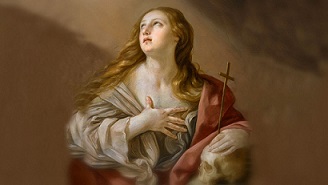
Mary Magdalene, a film by Garth Davis, skulked into American theaters in April of this year. It is a revisionist film with a decidedly feminist subtext attacking Peter and the early Church, that spends two hours relating a story about a woman who is only mentioned 12 times over a mere 67 verses in the Bible.
The film is loosely based on the gospel of Mary, discovered in 1896 in a 5th century papyrus codex, written in Sahidic Coptic. Along with missing a minimum of 10 pages, modern scholars do not agree on which of the six women in the New Testament named Mary it refers to so it is only tradition that it is Mary Magdalene.
In truth, it was not written by Mary Magdalene or any other Mary in the Bible. The Gnostic teachings found in the gospel of Mary date it to the late 2nd century AD, at its earliest. Similar to the gospels of Thomas, Philip, Judas, etc., it is a Gnostic forgery that claims, like all Gnostic writings, that Jesus delivered a private revelation to the writer that radically contradicts everything He taught. Mary Magdalene is a symbolic figurehead for Gnostic and other sects who claimed her as their authorization.
Gnosticism was perhaps the most dangerous heresy that threatened the early church during the first three centuries. Influenced by such philosophers as Plato, Gnosticism espouses a dualism regarding spirit and matter, asserting that matter was inherently evil and spirit was good. As a result of this presupposition, they believed anything done in the body, even the grossest sin, had no meaning because real life existed only in the spirit realm. They claimed to have possessed an elevated knowledge; a “higher truth” acquired from some mystical higher plane of existence and saw themselves as a privileged class elevated by deeper knowledge of God.
Gnostic theology claims the “unknowable” God was too pure and perfect to have anything to do with the material universe which was evil. Therefore, God generated lesser divinities, or emanations. One of these emanations, Wisdom, desired to know the unknowable God and out of his desire the demiurge, an evil god, was formed and it was this evil god that created the universe who, along with archons, kept the mortals in bondage in matter and tried to prevent the pure spirit souls from ascending back to God after the death of the physical bodies. Since, according to the Gnostics, matter is evil, deliverance from material form was attainable only through special knowledge revealed by special Gnostic teachers. Christ was the divine redeemer who descended from the spiritual realm to reveal the knowledge necessary for this redemption.
In the film, Mary Magdalene, we are introduced to a strong-willed woman who refuses to marry despite her father’s attempts to match-make. She flees to the synagogue to pray in distress and is rebuked for bringing dishonor on her family by appearing to be crazed. Her stubbornness is interpreted as demonic possession and she is tricked into an exorcism ritual where she is nearly drowned. She then encounters Jesus, flees her home to follow him and his apostles to Jerusalem.
Jesus as portrayed by Joaquin Phoenix is a very anguished Messiah who comes across as a kind of manic homeless man. The apostles are portrayed as clueless patriots who see Jesus as the key to overthrowing the Roman Empire. Judas is, of course, portrayed in a sympathetic light, as someone who lost his wife and child to the Romans. He befriends Mary telling her that Jesus will usher in God’s Kingdom, destroy the Roman authorities and bring the dead to life, including his wife and child, prompting Mary to complain to Jesus that the men think they will become like soldiers.
After Mary tells the apostles she saw the resurrected Jesus, she gets into an argument with Peter about the meaning of God’s Kingdom. Peter stresses the Second Coming, but Mary tells him that’s not what Jesus meant about God’s Kingdom. She even accuses Peter of inventing his own narrow teaching that will only serve his own self-interest and that of other men. Instead, Mary tells Peter that Jesus Christ’s idea of the Kingdom of God is to bring love, care and forgiveness to the humble, poor and suffering, and thereby make the world a better, more godly place.
Mary Magdalene is a revisionist film without a shred of evangelical intent. Like its treatment of miracles, it seems to want to “explain” (or expose) how this Christian myth happened, and to suggest that the best thing that came out of the cult was a strong woman leader who, had she been listened to and respected, might have been the one to lead an egalitarian Church, one very much like the one liberal Christians pine for today.
Source: MARY MAGDALENE, “An Incomplete, Ultimately Misleading Gospel”; Gnostic Scriptures and Fragments, The Gospel According to Mary Magdalene, the Gnostic Society Library; A Complete Translation of the Gospel of Mary by Miguel Conner

